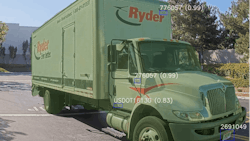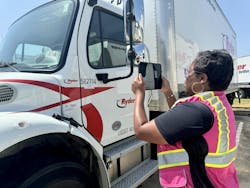Ryder System and Terminal Industries are working on a novel computer vision solution to automatically index and analyze trucks and trailers through a simple camera feed. The two companies just completed the technology’s first successful pilot program in a Ryder e-commerce fulfillment center in the City of Industry, California.
“It’s been a great success on multiple fronts,” Mike Plasencia, Ryder’s managing director for new product strategy and RyderVentures, told FleetOwner. “It’s a success for the use case, for the design partnership, and for the seating for future expansion opportunities—whether in that use case or other areas.”
The pilot program is the first major technology announcement after Terminal received $31 million in seed funding in mid-2023. Terminal emerged in 2023 as an AI startup focused on logistics optimization. The startup received funding from several businesses, including industry heavyweights Ryder, NFI, and Lineage Logistics.
See also: AI startup to automate yard operations
It may also indicate how digitalization could transform logistics going forward, suggests Max Constant, CEO of Terminal.
“We’re not just talking about one camera in one yard,” Constant told FleetOwner. “We’re talking about tens of thousands of cameras across thousands of yards, all communicating in real-time. That is truly transformational; that’s really never happened before.”
About the tech
The solution tested in Ryder’s and Terminal’s pilot uses computer vision technology to identify vehicles within yard operations.
A simple camera feed transmits data to a remote computing center capable of running a computer vision application. The application, trained with machine learning techniques to function under various conditions, can identify vehicles’ license plates, DOT numbers, and other relevant textual information.
Integrating this information with other databases can provide an extensive log of a yard’s vehicles, when they arrived or departed, their loads, their drivers, and so on.
AI pilot finds highly accurate detection rate
Since January, Ryder and Terminal have developed an ongoing pilot in a Ryder e-commerce fulfillment center in southern California. At the center, Terminal’s computer vision technology automatically indexes and analyzes trucks and trailers flowing in and out of the warehouse.
The companies announced that the pilot has processed more than 10,000 truck detections, achieving 99% accuracy in capturing license plates and DOT numbers.
“We have not seen this kind of accuracy with computer-vision technology previously, so this is a significant milestone in the race to modernize what is currently a very manual and inefficient process across the industry,” Karen Jones, CMO and head of new product development at Ryder, said. “It’s one thing to build a text-recognition algorithm that works on static objects or in an academic setting, but it’s quite another in the real world where we’re dealing with obscured license plates, hand-written DOT numbers, inclement weather, and any number of scenarios that affect visibility for cameras.”
The traditional human labor logging process is a challenge in optimizing yard operations. Solutions like the one piloted by Ryder and Terminal could help to improve logistics efficiency overall.
“It’s a manual process. It takes time. People can be doing other things; it’s error-prone,” Plasencia told FleetOwner. “Then when it gets keyed in, that’s another data entry error potentially. And then, when you slow things down, you can have a backlog of trucks and ultimately get into the yard—and that’s the worst case.
“By putting just a couple of cameras at the gate, we’re able to capture the same information off the vehicles.”
Plasencia mentioned that Ryder has over 100 million square feet of warehouse space, 600 shops, and countless yards of all different shapes, makes, and sizes. A flexible solution to automate the operation of those locations could lead to significant gains.
Another computer vision pilot in Texas
Ryder and Terminal launched a second pilot in July, using Terminal’s technology on mobile tablets to auto-capture available inventory at a Ryder truck rental and maintenance facility in the Dallas-Fort Worth area.
“In the e-commerce facility, you had a fixed camera with a moving vehicle go by,” Plasencia said. “And now what you have is a moving camera and a fixed truck—but the same technology.”
The companies have been able to quickly acclimate the technology to this new use-case.
“We’ve been super pleasantly surprised at how quickly things have ramped up. We’re very optimistic on the results of this one,” Plasencia told FleetOwner.
Big things ahead for this AI startup
These two announced pilot programs are just the beginning for Terminal’s disruptions in yard management.
Ryder and Terminal are working on other, unannounced applications for the technology.
“There’s other use-cases we have in the queue, and we’re excited to bring those forward,” Plasencia said.
Constant also suggested that Terminal may have other projects in the works.
“Without going into too much detail, because we don’t speak about these things publicly, you can probably assume that, if you look at our investor base, there are other meaningful activities—albeit in adjacent spaces—that are taking place across the supply chain,” Constant told FleetOwner.
Overall, both companies are happy with the current pilots.
“I think it’s also just a great thing for the logistics space in general,” Constant said. “And I think it’s an important signal for what’s to come.”
About the Author
Jeremy Wolfe
Editor
Editor Jeremy Wolfe joined the FleetOwner team in February 2024. He graduated from the University of Wisconsin-Stevens Point with majors in English and Philosophy. He previously served as Editor for Endeavor Business Media's Water Group publications.


